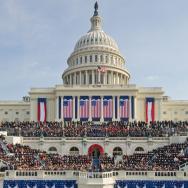Overall public confidence in the election system has changed little since 2016, but there have been significant shifts in the views of Democrats and Republicans.
Many Americans lack confidence in the security and accuracy of the country’s voting system heading into the 2018 midterm elections, according to a new UChicago Harris/AP-NORC Poll, which is a collaboration between the University of Chicago Harris School of Public Policy and The Associated Press-NORC Center for Public Affairs Research.
About 8 in 10 Americans are concerned the country’s voting system might be vulnerable to hackers, which is similar to public perceptions before the 2016 election. However, Democrats have grown increasingly concerned about election security in the last two years while Republicans have grown more confident.
The nationally representative survey of 1,059 adults finds Republicans are more likely than Democrats to have confidence in the accuracy of vote counts in the upcoming midterms (54 percent vs. 36 percent), which is a complete reversal of attitudes from 2016 when 49 percent of Democrats, but just a 32 percent Republicans had a lot of confidence in the vote counts.
When it comes to how people vote, the public has the most confidence when there is a voting machine with a paper record, which is the most popular voting method in the country.
In contrast, fewer Americans are confident that votes are accurately counted with newer election methods such as online voting or mail-in ballots. Only 28 percent favor the use of online voting in their states, and only 19 percent favor the exclusive use of mail-in ballots.
“Democracy only works when the public believes the result is legitimate. This new data suggests skepticism toward new voting technologies and genuine concern that votes will not be counted properly,” said Anthony Fowler, associate professor in the Harris School of Public Policy. “Election security is a serious matter, with large majorities expecting a range of federal officials, including national security organizations, to take more responsibility.”
Key findings
Most believe state, local and federal election officials as well as intelligence and national security officials should take responsibility for addressing the security of elections. Fewer, but still a majority, say Congress and the President should have a great deal or quite a bit of responsibility.
Among the study’s key findings:
- More than 40 percent are very concerned about the potential hacking of each of the following: voting registration information, voting equipment and final election results.
- There has been little change in the portion of the public that has a great deal of confidence in the accuracy of vote counts compared to 2016 (40 percent vs. 39 percent).
- Republicans are less likely to be very concerned about hackers impacting U.S. election systems than are Democrats (39 percent vs. 58 percent), whereas in 2016 Republicans were more likely than Democrats to be very concerned (52 percent vs. 35 percent).
- Seventy-nine percent of people say intelligence and national security agencies should have a great deal of responsibility for election security, while only 51 percent say the same about the president and 64 percent say the same about Congress.
- Eighty-eight percent have at least some confidence in the accuracy of vote counts with electronic machines that provide paper receipts, and 83 percent have confidence in paper ballots scanned into a machine, while only 66 percent have such confidence in electronic voting machines that do not provide paper receipts.
“This study provides important insights into a fundamental element of American democracy—voting and election legitimacy,” said Trevor Tompson, director of The AP-NORC Center. “The results show that the public has concerns about the security of the election system and has the most confidence in voting when there is a paper record.”
—Article originally appeared on the Harris Public Policy website

